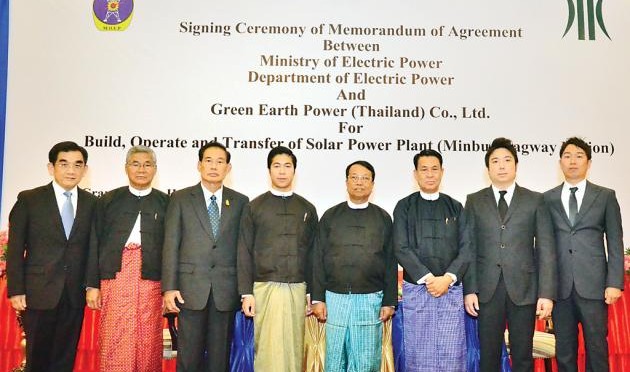Green Earth Power (Thailand) has signed a memorandum of agreement with the Myanmar Ministry of Electric Power (MOEP) to formalise the development of a 220-megawatt solar power plant in Minbu, in that country’s Magway Region.
The signing ceremony, held on Thursday at the Grand Amara Hotel in Nay Pyi Taw, marked an important milestone for the Myanmar power sector, with several cabinet ministers, deputy ministers and government officials present along with company officials from GEP.
Speaking at the ceremony, Electric Power Minister Khin Maung Soe fully affirmed the efforts previously made by both parties and wished for the continued cooperation for the successful implementation of the solar plant.
Aung Thiha, executive director of GEP, said Myanmar could become a major player in the development of renewable energy, and large-scale solar projects such as the one in Minbu were a testament to GEP’s confidence in the Myanmar government and presented one of the first opportunities to make use of that country’s vast potential in sustainable energy sources.
“Solar power is a solution to Myanmar’s immediate and long-term power needs,” he said. “It is quick to build solar power plants and we do not have to rely on the supply of fossil fuels or be subject to [their] price fluctuations. While we wait for the gas supply and for public opposition [to coal] to be resolved, we can fill the power-shortage gap with renewables.
“We have made significant progress since our MoU last year, and have completed all the preliminary work and site acquisition. We are finalising our discussions with our EPC [engineering, procurement and construction] contractor and project lenders and will be ready to implement [the project] soon.”
Supasit Pokinjaruras, managing director of GEP, said all the company’s hard work over the past 18 months had come to fruition.
GEP signed the memorandum of understanding for the project in May last year, and only after presenting its findings under a feasibility study and environmental impact assessment, along with extensive technical discussions with the Ministry of Electric Power (MOEP), was the MoU formalised as a firm commitment by both parties to develop the project.
The Minbu project is on a single 344-hectare (2,150 rai) site 200 kilometres west of Nay Pyi Taw. The project is due to begin construction in the first quarter of next year, with the first phase of 50MW to come online a year later. The solar power plant is to be built in four phases over 30 months with a total investment of US$350 million (Bt11.3 billion).
The solar power plant will be connected to the new 230-kilovolt transmission line that is being constructed by the MOEP, which will be the off-taker under a 30-year power purchase agreement.
“The Minbu project is to be one of the largest solar photovoltaic power plants and will create an estimated 700 jobs during its construction,” Supasit said. “This project will stimulate the local economy and provide new opportunities to many people.”
Formed in 2010, GEP is a Thailand-based company that develops and operates solar power projects throughout the Asean region and Japan. GEP is privately owned and has plans to list on the Stock Exchange of Thailand in the next two to three years.


